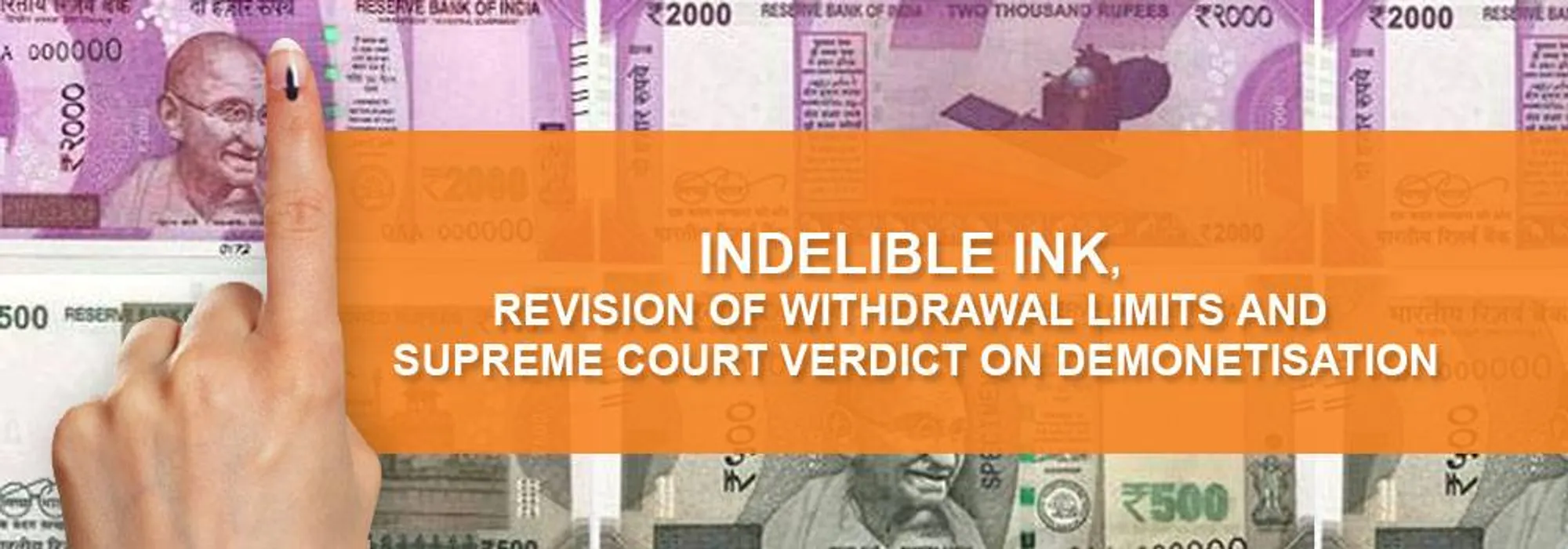Exactly a week ago the Indian Prime Minister Mr. Narendra Modi in a surprise announcement to the nation said within a few hours following his announcement the old currency of 500 and 1,000 denomination would not be valid for any transaction, sending the country into a state of shock. All old currency had to be deposited in banks before the last date of the year. The sudden move was a much required measure to check corruption and black money in the country.
As the opposition parties rallied to confront the government on the recent issue of demonetisation, during the winter session of Parliament, the Economic Affairs Secretary, Shaktikanta Das announced at a press meet on Tuesday that indelible ink would be applied on the right hand finger of those exchanging currency at banks. This would apply to those exchanging bigger denomination notes of 500 and 1,000.
The new rule would be implemented from Wednesday as a measure to prevent repeat exchangers from crowding the banks. This is also to ensure that the quota of new currency assigned to each person does not go bust. This measure has been taken to prevent unscrupulous people from sending others to various banks to exchange notes repeatedly for them. The same people would keep appearing at different bank queues while others were deprived of a chance to collect the new currency.
Even after a week of Mr. Modi’s surprise announcement banks are overflowing and unable to cope with the huge rush for new currency by customers. Serpentine queues stretching for kilometres at some places, are a normal sight. Despite petitions being filed at the Supreme Court against the recent move by the government, the top court has refused to intervene in the matter. Petitioners are blaming the government for the poor timing of the decision saying farmers have been hit hard just ahead of the harvest season and families have had to cancel or postpone weddings till the pressure eases.
The Supreme Court, while reserving its comments on the demonetization issue, urged the government to look for solutions to ease the suffering of the common man with respect to the sudden introduction of new currency. Meanwhile a special task force has been constituted to keep track of the fake notes that are circulating in some vulnerable parts of the country. Prime Minister Modi has been regularly reviewing the supply of currency. Places of worship, which usually are a storehouse of notes in smaller denominations, have been asked to deposit the same at banks so the supply increases.
The Economic Affairs Secretary also urged the people of the country not to fall prey to some rumours doing the rounds, like shortage of certain essential commodities or strikes at prominent institutions. He appealed to the people to support the government’s decision and help cope with the crisis which would be over soon. Opposition parties like the Congress blamed the government for the chaos in the country and said the demonetisation would lead to an adverse effect on the GDP as almost 86% of the bank notes had been frozen in terms of value.
The Finance Minister assured the harrowed citizens that there was no paucity of cash in banks and delivery channels were being increased so as to minimize the inconvenience caused to the public. New measures have also been issued like withdrawal of Rs 500 notes through ATMs. The limits for withdrawal and exchange have also been revised. People can now exchange 4,500 worth of old notes for the new currency per day and cash of Rs. 2,500 / day per card can be withdrawn from the recalibrated ATMs. The earlier cap of 10,000 / day has also been removed. Weekly withdrawal limits from bank accounts have been increased from 20,000 to 24,000.
Banks and post offices have been instructed to ensure that the new currency of all denomination is properly distributed. Banks have been specially asked to stock up on and distribute small denomination notes. Banking Correspondents and mobile banking vans have been deployed to the farthest corners of the country, especially the rural regions where people are facing a crunch of cash availability. Complaints regarding non acceptance of cheques, demand drafts and online payment transfers by hospitals, businesses, caterers etc can be made to the local administrative officers.
Help is also being rendered to the senior citizens and disabled by instructing banks and post offices to have separate queues for them. Supply of new currency has been enhanced at banks and post offices so that the cash strapped citizens can get a bigger quantum of the new notes. The government has extended the deadline for accepting old series of 500 and 1,000 denomination notes till 24th November for limited categories like electricity and water bills, hospitals, petrol pumps, taxes and penalties payable to the government etc.
The old notes of 500 have been replaced with refurbished ones of the same denomination and instead of the Rs 1,000 note, a new Rs 2,000 has been introduced which is still in short supply. The recent move which came like a bolt from the blue, though admirable and praiseworthy, has disrupted daily life especially for the poor. Whether Mr. Modi’s gamble will pay off or not, only time can tell.

